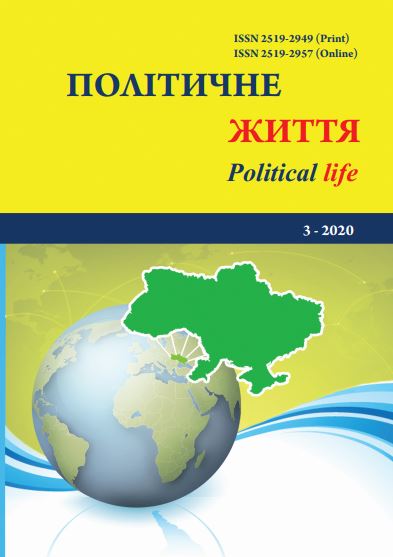The system of control and supervision over the Special Services of the Federal Republic of Germany at the end of the XX – beginning of the XXI century
DOI:
https://doi.org/10.31558/2519-2949.2020.3.1Abstract
This article analyses and generalizes the experience of organizing and exercising control and supervision over the activities of Special Services of the Federal Republic of Germany (Germany) under the conditions of challenges and threats to its national security, defence and interests in the late XX – early XXI century, a number of inherent features is identified.
It is established that the control and supervision over the Special Services of Germany is organized and exercised by the institutions of Legislative, Executive and Judicial power, its representative bodies, independent institutions and public organizations determined by the legislation.
A notable feature of this process is the joint control of the government and parliament over the observance of human rights and freedoms by Special Services when performing their professional tasks via a single Federal Commissioner defined by law.
Another feature is the approach to allowing Special Services to choose the methods of obtaining intelligence data – through the balance of the criteria of "admissibility" (violation of human rights and freedoms) and "necessity" (obtaining information in a way that violates human rights and freedoms, and not others).
The scope of rights and powers defined by the legislation of Germany to the Special Committee on Confidential Affairs of the Bundestag is not inherent to legislation of other countries. Having information on planned professional activities and tasks of special services, it forms their budget, evaluates its implementation and, if necessary, investigates misuse of accountable funds.
In Germany, as in no other country, the right of the Judiciary to supervise the activities of Special Services is limited – only the consideration of civil claims for compensation for material damage caused by Special Services activities, and audits of their financial activities.
References
Партнерство заради миру. Рамковий документ від 10.01.1994. Дипломатичний вісник. 1994. № 13–14. С. 32–33. URL : https://zakon.rada./ gov.ua/laws/show/950_001 (дата звернення: 04.05.2020).
Доповідь Ради Європи від 12 червня 2002 року. URL : https://AS/POL/(2002)07REV2, article 34 (дата звернення: 16.05.2020).
Спецслужби Німеччини. URL : https://uk.wikipedia.org/wiki (дата звернення: 18.05.2020).
Надзор за деятельностью разведывательных служб : практ. пособ. / под ред. Г. Борна, Э. Уиллза. Женева : ДКВС, 2016. 240 с.
Основи демократичного цивільного контролю над сектором безпеки і оборони : навч.-мет. матер. / В. А. Ященко та ін. Київ : АртЕк, 2019. 106 с.
Сіцінська М. В. Зарубіжний досвід організації та здійснення цивільного контролю за спецслужбами. URL : http://www.investplan.com.ua/pdf/6/_2017/16.pdf (дата звернення: 21.05.2020).
Віллз А. Розуміння підзвітності розвідки : посіб. Женева : DCAF, 2010. 53 c.
Конституционный суд ФРГ запретил разведке следить без повода за интернет-коммуникацией. URL : https://www.dw.com/ru/a-53495915 (дата звернення: 15.05.2020).
Немецкий журналист: Разведка ФРГ действует независимо от руководства. URL : https://www.dw.com/ru/a-19222487 (дата звернення: 11.05.2020).

